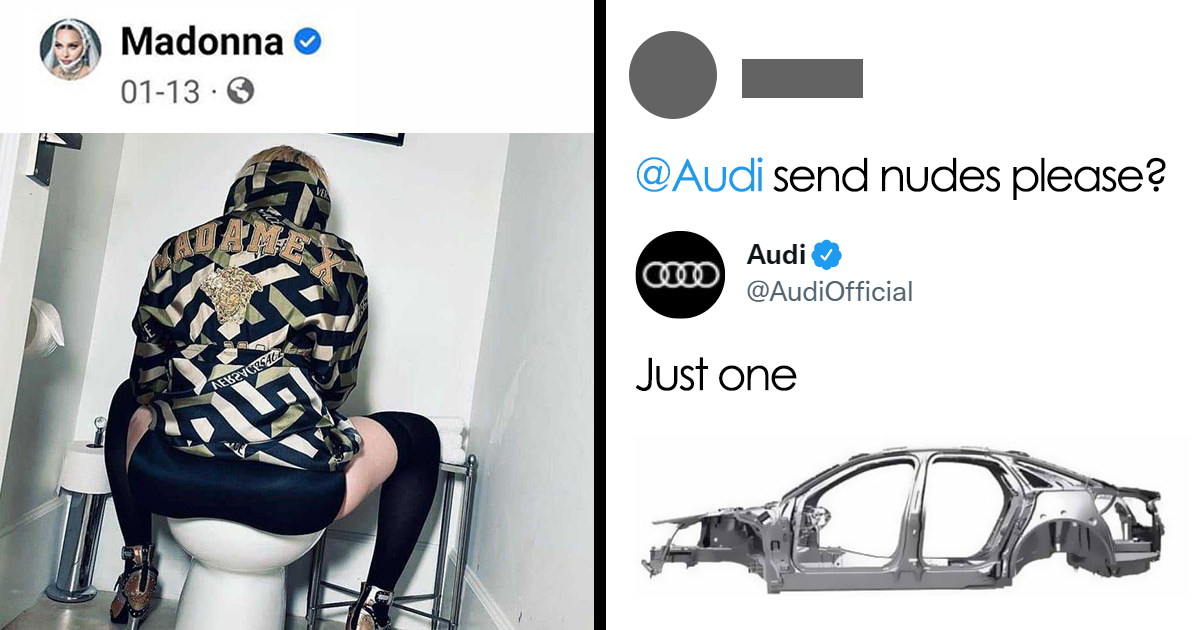While browsing the internet, you come across the craziest things. Like this ragtag Facebook group that describes itself as “a place to share all the weird stuff posted by official Facebook pages, celebrities, etc.”
Created in 2019, the group called “Bizarre stuff found on official accounts posting” has 166.5K members who share all kinds of unusual things posted by official pages. Think official accounts belonging to Mike Tyson, Elon Musk and Cardi B, and even official pages of companies and institutions, like Discord, Skittles and Uni Of Liverpool.
Among the group’s rules, submissions are welcome if members “make sure they’re WEIRD”. The moderators explain: “Just because the message comes from an official account doesn’t mean it’s weird. Make sure it’s quirky and official, to match the theme of the page. So below we’ve picked out some of the most entertaining posts we wouldn’t expect from someone so established. Scroll down and hit upvote on your favorites!
When it comes to the endless amount of content people share online daily, it’s easy to come across posts that don’t make sense. Whether from official pages or private users, some things are best kept to themselves, but the truth is, we all have a tendency to overshare. So, to learn more about this common phenomenon, we spoke with Audrey Tang, the award-winning author, media spokesperson, trainer, and development coach, who happily shared some interesting insights into this topic.
“To give people the benefit of the doubt, it may just be that some people still don’t know what to post on social media…after all, my mom was practically writing me a letter as a comment, using Facebook to the same way. send an email! So maybe we don’t all know when there’s ‘too much information,'” Tang told us.
“This is exacerbated by a certain anonymity (or at least a filter) that we can hide behind when it comes to saying something online. We often don’t need to divulge our true identity, or we may have created and curated an online persona that can give us the confidence we might otherwise lack face to face…and we don’t see (nor don’t think about it often) possible reactions.
Tang argues that “it can in some ways be beneficial – it can actually be very helpful and therapeutic to keep a blog or photo log of a life journey (e.g. weight loss) – if you do it for yourself, and sometimes sharing it can raise awareness or inspire others, BUT, what we need to remember is when it comes to social media… it doesn’t make us racist, rude or mean.. .it’s just a tool…how we choose to use it is always a reflection on us.”
She continued, “Then more ‘virtually’ – gossip gets likes…and likes are a form of currency in the social media driven world of 21c. Rather than gauging our popularity by how many people attendance at our birthday party or the number of guests at the prom, if you have already deleted a message for lack of likes, you also work in this motto! »
According to Tang, if we are angry, it is also popular! “Misery loves company, and sometimes when you’re in a bad mood you don’t want to learn, you don’t want to grow, you just want to be heard! So we aired our rant and when it’s “liked” (because out of the entire population of those on social media, someone is likely to agree, even with very extreme comments or unpleasant) – we feel validated.
“Digging into this, Julian Baggini in his book ‘Complaints’ says that complaining (or ranting) is a social norm and some of us actually appreciate it – at least towards each other – especially when it’s someone else is acting!!It can make us feel part of something – we feel validated.
But there is another side to this. Tang argues that related to this, psychologically and unfortunately, is how often we feel ignored. “You don’t have to have been through deeply traumatic events to feel a sense of rejection, let alone have an impact on your life. If we as children were always told ‘Courage,'” stop it,” and/or if our feelings were never acknowledged (even the idea of ”family restraint” can lead some kids to believe they’re not as important as the people mommy and daddy are trying to impress ), we can grow up with a need for recognition, without really having learned the tools to obtain it.
According to Tang, “As such, we try different ways to receive what we crave and – objectively – one effective way is to say something negative about others, or do a bit of a rant. (The latter will at least give us the odd “You Ok hun?)”

